My post for this event is coming a little early, as I am leaving for the TCM Film Festival in Hollywood tomorrow night! I wanted to make sure I got my article finished before I leave, as I probably won’t have time to do so while I’m in California. I hope to see William Holden in Sabrina while I’m at the festival, but we’ll see. But I digress, today I am not talking about Holden in Sabrina, I am talking about Holden in his breakout role in Sunset Boulevard.
Prior to 1950, Holden’s career was languishing. His first starring role came in 1939’s Golden Boy, co-starring Barbara Stanwyck. Despite Stanwyck’s enormous help and use of her star power to keep Holden from being fired from the production (a kindness that Holden never forgot and repaid his gratitude by sending her flowers every year on the anniversary of Golden Boy‘s first day of production), this film did not prove to be the breakout hit Holden needed to be considered a movie star. He did appear in films with A-list actors such as Humphrey Bogart, Jean Arthur, Ray Milland, Veronica Lake, to name a few, but none of these films would provide Holden with an opportunity to breakout.
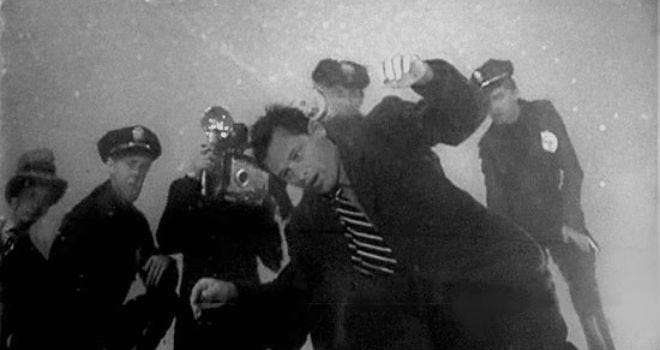
After returning from serving in World War II, Holden was placed in a variety of smaller films, where he played what he called “smiling Jim” roles. Holden grew weary of such films and wanted something that would actually challenge his acting ability and give him a different type of role to play. He found that in 1949 when he was offered the role of Joe Gillis, a down on his luck screenwriter in Billy Wilder’s next film, Sunset Boulevard. Wilder’s first choice, Montgomery Clift, had dropped out of the film’s production. Holden wisely saw Wilder’s film as his opportunity to do something different and accepted the role.

Sunset Boulevard was the perfect showcase for what would become Holden’s trademark onscreen persona–the handsome and charming, yet flawed man who was cynical of the world around him. His persona is similar to Humphrey Bogart’s except that Holden was classically handsome and could charm anyone with a flash of his smile. Both Bogart and Holden’s characters were often cynical, but Bogart often imbued his performances with a vulnerable quality. Holden’s characters tended to be more heroic and called upon to do the right thing, even if he himself didn’t believe in it. In ‘Sunset,’ Holden ultimately has to do what’s right for Betty Schaefer and his friend (and her fiancé) Artie–even if it’s not what he would have wanted for himself.
Wilder’s film features a very unusual and somewhat macabre framing device–the story’s narrative is told by the corpse of Joe Gillis (Holden), who at the beginning of the film, is seen floating facedown in the pool at silent film star Norma Desmond’s mansion. Wilder’s previous film noir, Double Indemnity, also used a narrator who recounted the previous events leading to that moment. Except in that film, the narrator, Walter Neff, is still alive and is dictating his story into his boss’ Dictaphone. In ‘Boulevard,’ we see the lifeless frozen in time face of Gillis as he goes into his story:
JOE: Yes, this is Sunset Boulevard, Los Angeles, California. It’s about five o’clock in the morning. That’s the homicide squad – complete with detectives and newspapermen. A murder has been reported from one of those great big houses in the ten thousand block. You’ll read about it in the late editions, I’m sure. You’ll get it over your radio and see it on television because an old-time star is involved–one of the biggest. But before you hear it all distorted and blown out of proportion, before those Hollywood columnists get their hands on it, maybe you’d like to hear the facts, the whole truth. If so, you’ve come to the right party. You see, the body of a young man was found floating in the pool of her mansion–with two shots in his back and one in his stomach. Nobody important, really. Just a movie writer with a couple of B pictures to his credit. The poor dope! He always wanted a pool. Well, in the end, he got himself a pool–only the price turned out to be a little high. Let’s go back about six months and find the day when it all started.
William Holden as “Joe Gillis” in Sunset Boulevard
The film then segues into the beginning of the flashback. Joe Gillis is at Paramount trying to sell a story idea he’s written, hoping that the studio will buy it and hire him to write the screenplay. A studio “reader,” Betty Schaefer (Nancy Olson) is already in the office talking to the studio head, advising him to turn down the story. Unfortunately for Betty, Joe overhears the conversation and is upset. Later, when returning home, Joe notices that he’s being followed by a pair of men looking to repossess his car. Trying to outrun and hide from the men, he turns into the driveway of a seemingly deserted mansion, and hides his car in the garage.
JOE: Wait a minute, haven’t I seen you before? I know your face…You’re Norma Desmond. You used to be in silent pictures. You used to be big.
William Holden as “Joe Gillis” and Gloria Swanson as “Norma Desmond” in Sunset Boulevard.
NORMA: I *am* big, it’s the *pictures* that got small.
However, the mansion is not deserted! It in fact belongs to former silent film star, Norma Desmond (Gloria Swanson). Norma hasn’t made a film for over twenty years, but still believes she’s every inch the major Hollywood star. She ambles around in her cavernous mansion, filled with luxurious and expensive decor. Photographs of Norma (real photographs of Swanson during her silent film career) in her heyday are prominently placed throughout the home. Evenings are filled with Norma watching herself perform in her films. Norma is determined to make a comeback, despite hating the word “comeback.” She prefers to think of it as a “return,” a return to the millions of people who won’t forgive her for deserting the screen. Norma’s comeback is set to be a new adaptation of Salome, a script that she has written for herself.
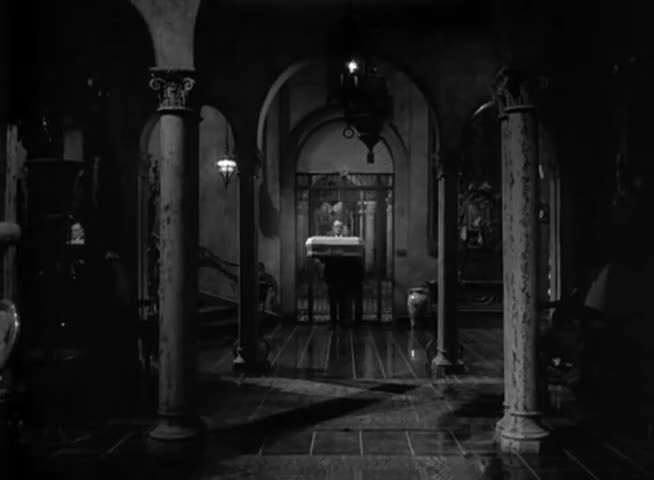
Norma’s butler, Max (Erich von Stroheim), exists solely to feed into Norma’s disillusions about her level of celebrity. He gives into her every whim, whether it’s holding a funeral for her dead monkey or organizing a New Years Eve party, complete with an orchestra, for no guests. Max to his credit, is cognizant of Norma’s mental state and takes precautions, such as removing the door knobs so that she cannot lock herself inside when she decides to harm herself. Despite how crazy and funny Norma seems on the outside, inside this is a woman who is struggling and is in desperate need of some therapy and mental help. Norma is a tragic figure in this film.
Having heard that Joe is a writer, Norma hires him to help her with her Salome script. Joe finds the writing abysmal, but with his car about to be repossessed, and his rent in arrears, he realizes that he cannot afford to turn her offer down. Norma has Max set up a room for Joe and soon he’s part of Norma’s life. Norma is ecstatic having Joe around and treats him to champagne, and invites him to engage in one of her favorite pastimes–watching her own movies.
NORMA: We didn’t need dialogue. We had faces!
Gloria Swanson as “Norma Desmond” in Sunset Boulevard

The deserted mansion implies that Norma is a bit of a recluse. She does have some visitors, such as “the Waxworks” i.e., her silent film friends who come by once a week to play bridge. This is such a fun sequence, if only to see Buster Keaton, who was known to be an excellent bridge player. He memorably says “Pass” twice during the game. Joe’s continued presence in the home inspires Norma to have Max dust off her old car, a 1929 Isotta Fraschini. By this point, Joe’s work on Norma’s script is long done, and he continues to live with Norma, indulging her fantasies and delusions. She’s tired of Joe’s “dreadful” shirt, his boring sports jacket, and his baggy pants. Norma takes Joe shopping for a brand new wardrobe, and this is the scene that cements Joe’s new status in Norma’s life–kept man. The salesman at the men’s clothing store has a memorable line that sums up Joe’s entire situation when he’s hesitant to allow her to buy him an expensive Vicuna overcoat over the less expensive camel’s hair:
SALESMAN: As long as the lady is paying for it, why not take the Vicuna?
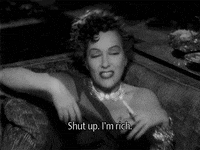
Joe does take the Vicuna and with that starts the second act and one of the most memorable sequences in the film, Norma’s New Years Eve party. She has Max hire an orchestra, put together an enormous spread of food and champagne, everything that would make for a great party. Joe comes down the grand staircase in a beautiful tuxedo with tails and marvels at the scene. He takes Norma’s hand and while dancing, he innocently asks where the other guests are. There are no guests she exclaims, gleefully. Joe realizes that Norma has fallen in love with him. Hmm. Apparently he didn’t realize that when she bought him a brand new wardrobe? Then comes one of my favorite Norma Desmond quotes when she tries to offer Joe a New Years Eve gift:
JOE: Norma, I can’t take it. You’ve bought me enough.
William Holden as “Joe Gillis” and Gloria Swanson as “Norma Desmond” in Sunset Boulevard.
NORMA: Shut up! I’m rich. I’m richer than all this new Hollywood trash. I’ve got a million dollars.
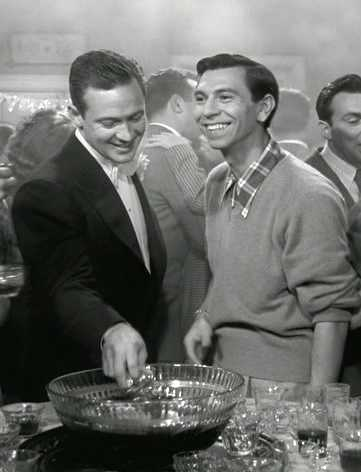
Joe eventually leaves and heads to the New Years Eve party of his friend, Artie Green (Jack Webb). As an side, I think this film is the most animated performance I’ve ever seen from Jack Webb. But I digress. Artie’s party is definitely a more raucous and less refined affair than Norma’s party for two. While at the party, Joe runs into Betty again and learns that she’s Artie’s fiancée. However, the two start talking “shop” and discussing Joe’s story idea. Betty comes up with a concept that works with Joe’s idea but changes the setting and characters’ occupation. The two seem to develop an affection for one another as they discuss Joe’s story and get excited by its potential. Eventually though, Joe has to leave and return to Norma.
This scene sets up the overall main conflict of the film: Norma’s obsession with Joe versus Joe and Betty’s burgeoning love affair. When Joe returns home from Artie’s, he learns that Norma attempted suicide over his leaving. Feeling guilty, Joe goes to Norma’s room and ends up wishing her a Happy New Years and kisses her. Talk about mixed signals.
Throughout most of the remainder of the film’s running time, Joe is secretly leaving Norma’s home in the evenings and meeting up with Betty at Paramount. The two are excitedly working together on a story treatment that they hope to sell to the studio. Betty tells Joe about her dreams and past which only endears her to him. She also wants to be a screenwriter and hopes this story may earn her a promotion from reader. Joe is endeared by Betty’s youth and optimism and finds himself falling in love with her. This causes him to feel conflicted, as he doesn’t want to steal his friend’s girlfriend.
JOE: How old are you anyway?
William Holden as “Joe Gillis” and Nancy Olson as “Betty Schaefer in Sunset Boulevard.
BETTY: Twenty two.
JOE: That’s it–there’s nothing like being twenty two. Now may I suggest that if we’re ever to finish this story you keep at least two feet away from me…now back to the typewriter.
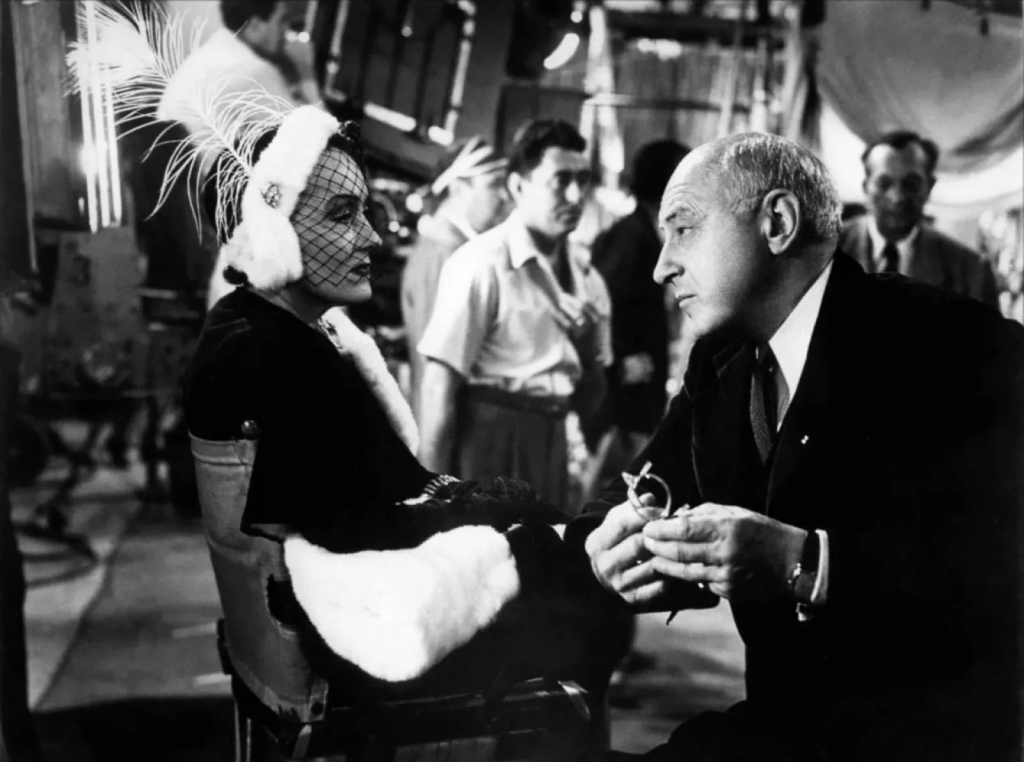
Norma’s opportunity to make a “return” seems to come when she’s contacted by Gordon Cole at Paramount. He wants Norma to come down to the studio and talk about Cecil B. DeMille’s next film. Norma had Max deliver her completed draft of her Salome script to DeMille, so naturally, she thinks that Mr. Cole wants her to come down to discuss it. Norma makes her triumphant return to Paramount, despite only being allowed in because the old studio guard recognized her. When she arrives, DeMille is in the middle of shooting a scene for his next film. He has her sit down and while she waits, the lighting man recognizes her and shines a spotlight on her. Then other employees are heard in succession, saying Norma Desmond’s name. This sets up one of my favorite lines in the movie:
PARAMOUNT SECURITY GUARD: Why I thought she was dead!
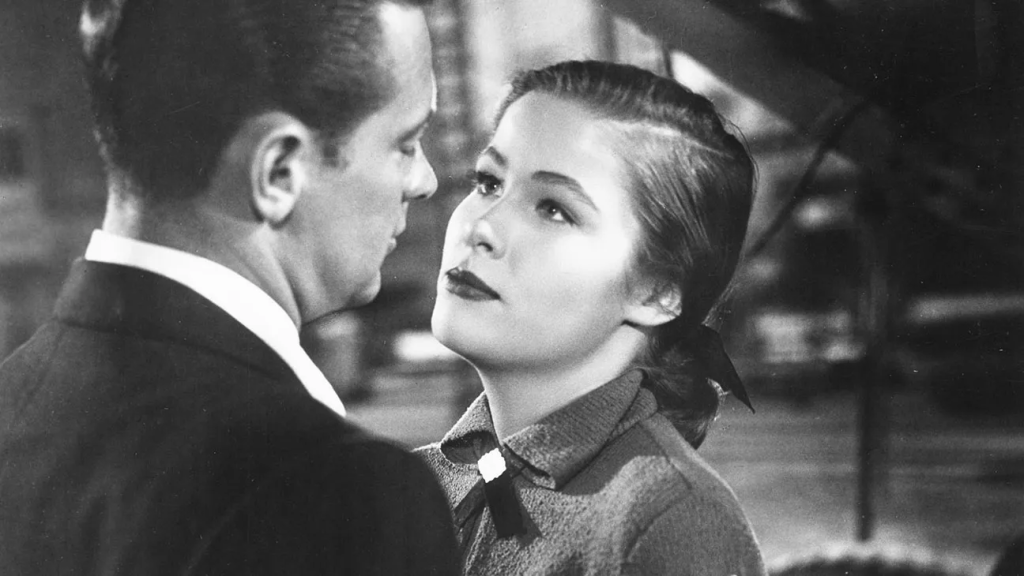
The final act of the film is where Norma’s obsession with Joe and Joe and Betty’s late night story writing plot lines come to a head. Norma begins to become suspicious of Joe’s late night trips. She finds out about Betty and becomes extremely jealous and telephones her over and over. Joe overhears Norma talking to Betty and interrupts the call. Knowing that he needs to end things with Betty as to not hurt Artie, he tells her to come over to Norma’s home. When he does, he essentially explains to her that he’s the kept man of Norma Desmond and runs her out of his life by pretending to brag and gloat about the lavish lifestyle he’s living with Norma. While we’re led to believe that Joe is just saying these things to drive Betty away and back to Artie, one has to wonder if he truly believes his lie. Despite thinking Norma was nuts at the beginning and just accepting what he thought would be easy money, Joe seems to enjoy his time with Norma. He lives lavishly, enjoys nice food, champagne, her pool, she has everything he wants. It’s easy to see why Norma would be in love with him. He’s young, he’s handsome, he’s charming, he has everything an aging woman would want. I could write a whole article about how Norma Desmond is truly the victim of Sunset Boulevard, despite murdering Joe. But that’s for another day.
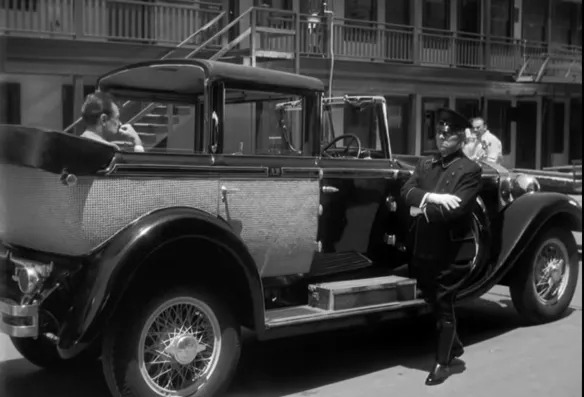
Max finds out the truth about why Paramount wanted to see Norma on the lot. It wasn’t for Salome, but rather they wanted to use her car in a film. Upon hearing the reason, Cecil B. DeMille cannot in good faith hurt Norma’s feelings and tells Gordon Cole to find another car. Once again the people in Norma’s life protect her from the truth. Joe FINALLY grows a back bone and some self-respect and decides to leave Norma’s home. Except she’s a woman scorned and she will not let him leave. While walking past the pool, Norma shoots Joe three times and he collapses, face first into the pool. That brings us back to the beginning of the film.
JOE: Well this is where you came in. Here’s that pool again, the one I always wanted.
William Holden as “Joe Gillis” in Sunset Boulevard.
Norma Desmond’s final scene in Sunset Boulevard is spectacular. The police are on the scene, ready to take Norma in for murder. Hedda Hopper is there, wanting her paper to take her story direct, live from Norma’s bedroom. Reporters with newsreel cameras, to capture Norma’s arrest are huddled around. Every one is there, except Norma’s grip on reality. Her madness has finally reached its peak. Max, no longer complicit in maintaining Norma’s fantasy life, uses her delusions of grandeur against her to lure her into the waiting police car. As Norma’s former director, Max positions himself amongst the newsreel cameras, telling Norma that they’re here to start shooting Salome.
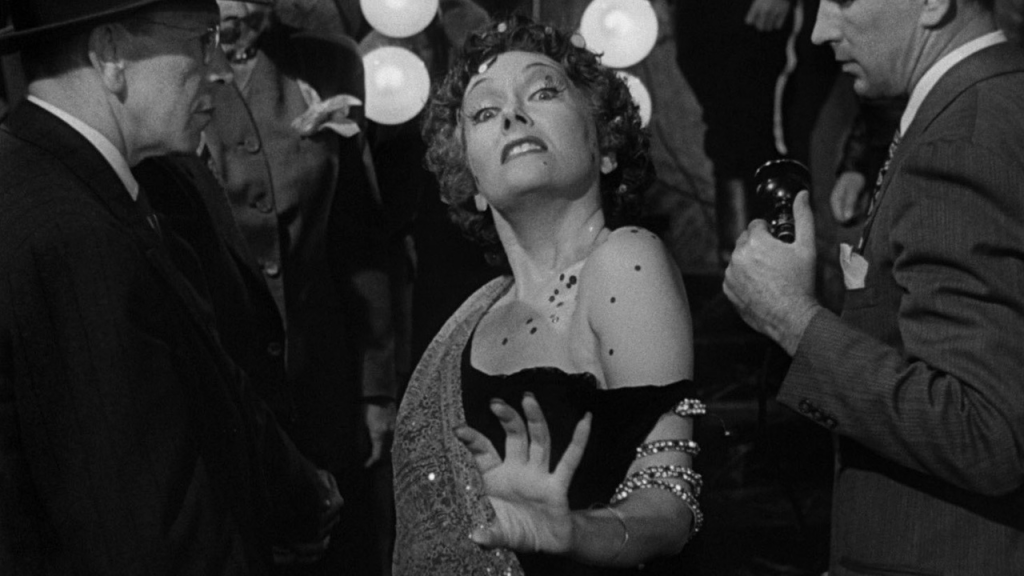
Norma’s descent down the stairs is completely surreal. As she makes her way to the bottom, everyone else in the scene remains completely still. Norma makes her way towards Max, arms reaching out towards the camera. She’s ready to make her triumphant return. Norma makes a speech about how happy she is to be back in front of the camera. She looks completely bonkers as she finally makes her way to her mark to start filming her scene. Reaching out one more time towards the camera she says in an oft-misquoted line:
NORMA: All right, Mr. DeMille, I’m ready for my close-up.
Gloria Swanson as “Norma Desmond” in Sunset Boulevard

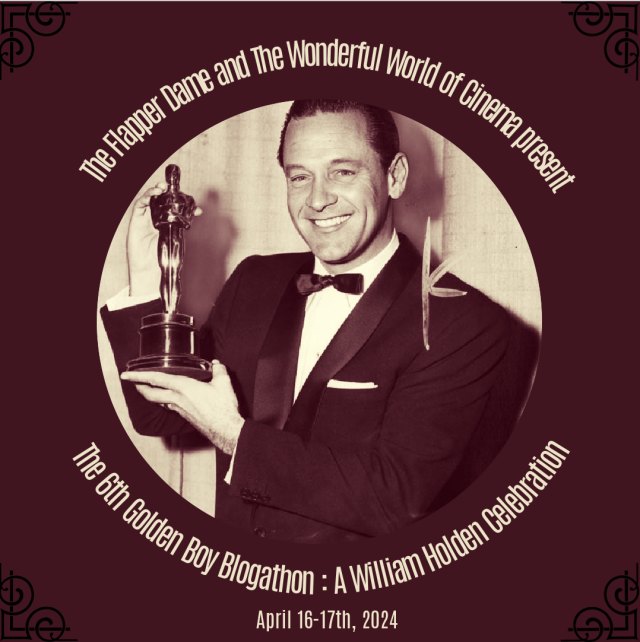
Pingback: DAY 1 of the 6th William Holden Golden Boy Blogathon! April 16 2024 – The Flapper Dame
I could watch Sunset Blvd on repeat and never get bored. What a quotable movie too. It’s dark, tragic, and yet often funny too, and Holden’s performance suits that tone perfectly.
LikeLiked by 3 people
Great post Whimsically 🙂 What else can be said about Sunset Boulevard that has not already been said 🙂 I agree with everything you wrote 🙂 The performances, the social commentary and the fact that the narrator is a dead man (among other things) stand out among the most talked about aspects of the film.
LikeLiked by 1 person
Pingback: Day 2 of The 6th Golden Boy Blogathon: A William Holden Celebration – The Wonderful World of Cinema
Thanks a lot for this great article, Kayla! To me, Sunset Boulevard is truly a perfect film and the one that made me love William Holden. To be honest I never dared write about it because I just wouldn’t know where to start since there are too many qualities (I have the same feeling with Rear Window). Thanks a lot for taking part in the blogathon! I hope you are enjoying yourself at the TCMFF!
LikeLiked by 1 person
Pingback: Many thanks to the participants of The 6th Golden Boy Blogathon: A William Holden Celebration! – The Wonderful World of Cinema
I love this movie! It’s Hollywood navel-gazing at its finest and only Billy Wilder could pull it off like this.
LikeLike